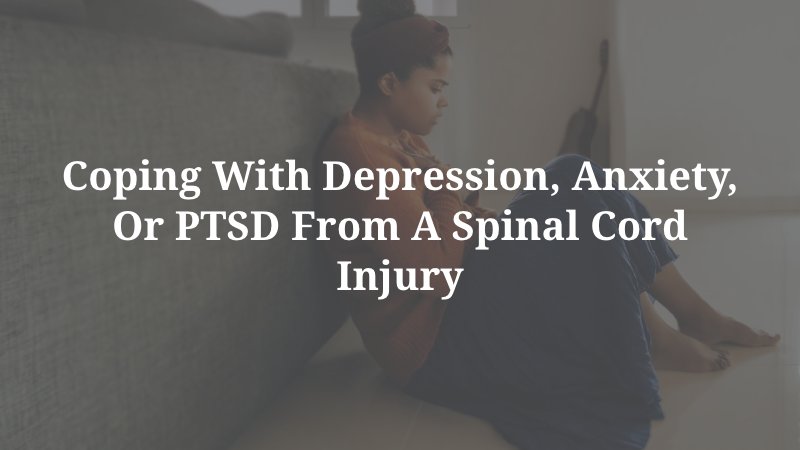Coping with Depression, Anxiety, or PTSD from a Spinal Cord Injury

A spinal cord injury (SCI) is a life-changing event that can cause depression, anxiety, and post-traumatic stress disorder (PTSD) in individuals. Coping with these mental health challenges can be extremely difficult, but it is possible with the right strategies and support.
Depression
Depression is common after suffering a spinal cord injury (SCI). The sudden change in physical abilities, loss of independence, and challenges associated with rehabilitation can all contribute to feelings of sadness and hopelessness.
Here are some strategies that may help:
Seek Professional Counseling
A mental health professional can provide support, guidance, and counseling. In addition, they may recommend cognitive-behavioral therapy (CBT) and/or antidepressant medication.
Stay Connected
Isolation and loneliness can contribute to depression. Therefore, it is important to stay connected with friends and family, join support groups, or engage in online communities to avoid these feelings.
Exercise
Low-impact physical exercise can help reduce symptoms of depression. A physical therapist can develop an exercise program that suits your abilities.
Practice Self-Care
Engage in activities that you enjoy and find relaxing, such as taking a warm bath, listening to music, or reading a book.
Anxiety
Anxiety is another common mental health challenge for people with SCIs. Anxiety can manifest as worry, fear, and panic attacks, and when it becomes excessive or persistent, it can interfere with daily life. Here are some strategies that may help you cope with anxiety:
Practice Relaxation Techniques
Deep breathing, meditation, or progressive muscle relaxation can help reduce symptoms.
Identify Triggers
Identify situations or events that trigger your anxiety and try to avoid them. If avoidance is not possible, work with a mental health professional to develop coping strategies for those triggers.
Challenge Negative Thoughts
Anxiety can be fueled by negative thoughts. Learn to challenge these thoughts by asking yourself if they are accurate, helpful, or rational.
Develop a Routine
Establishing a daily routine can help reduce anxiety by providing structure and predictability.
PTSD
For people with SCIs, the trauma of the injury or how it occurred and the associated challenges can contribute to PTSD. The condition can cause distressing symptoms such as flashbacks, nightmares, intrusive thoughts, avoidance behavior, and hypervigilance. Here are some coping mechanisms that may help:
Seek Professional Help
A qualified mental health professional can help you process your emotions, identify triggers, and develop strategies to help your symptoms. Several types of treatment can be used to treat PTSD, including cognitive-behavioral therapy (CBT), eye movement desensitization and reprocessing (EMDR), exposure therapy which gradually exposes you to the traumatic event in a safe and controlled environment, and medications.
Practice Self-Care
Yoga, listening to music, reading a book, and meditation can help.
Participate in Physical Activities
Engaging in activities that you enjoy that are safe and appropriate for your level of injury can help boost your mood and overall well-being.
It is important to note that not all treatments or strategies work for everyone, and it may take time to find the right approach that works best for an individual.

